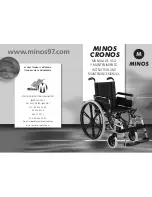
Tiga User Manual
UM-Tiga-017-US
Tiga User Manual |
13
Procedure 5 - Castor Wheels and Forks
Procedure 5 & 6
Castor Bearings must be fitted by an authorised
dealer. Failure to do so will result in invalid warranty
on the parts.
NOTE:
CAUTION:
DO NOT replace the front castor forks or castor
wheels with a different size other than what was
originally supplied on the chair.
By changing to a different size castor fork or castor
wheel will have an adverse effect on the running
of the chair and the end users balance causing
personal injury.
The castor wheels at the front of the wheelchair will wear just like care tyres and should be replaced when they visibly look
worn or cracks appear.
5.1: Changing castor wheels
Using 2 x 4mm allen keys from the toolkit, remove 1 of the
2 screws in the centre of the castor wheel, as shown in Fig 8.
Remove the screw and slide out the castor axle with the other
screw still attached, noting any spacers and their positions.
Install the new castor wheel and slide the castor axle back
through and secure with the final screw.
5.2: Removing the castor fork
Remove cap at the top of the castor housing. Using the socket
from the toolkit, release and remove the locking nut. This will
release the castor fork, and take note of any spacers and their
positions.
Procedure 6 - Wheel Locks
WARNING:
After any adjustments, repair or service and before use, make sure all attaching hardware is tightened securely –
otherwise injury or damaged may result. If wheel locks do not hold occupied wheelchair in place please adjust as
above, or contact your dealer – otherwise injury or damages may occur. The wheel locks are designed to work when
your wheelchair is static. Wheel locks should not be applied during use and tyre pressure should be as indicated on
the tyre.
Before adjusting or replacing any style of wheel lock ensure that the tyres are
inflated to the recommended pressure as indicated on the tyre.
NOTE:
The wheel locks are adjustable in position to suit tyre changes and wear. As tyres
wear, the wheel lock may not hold the wheelchair as intended, so these need to be
adjusted to suit the tyre condition.
6.1: Adjusting Wheel locks
Using a 5mm Allen key from the toolkit, release the 2 screws in the clamp or on the
underside of the plate. Once the wheel lock is loose, reposition so that there is at
least 3mm of interference when the wheel lock is activated. Tighten securely and
repeat on the other side.
Fig 8.










































